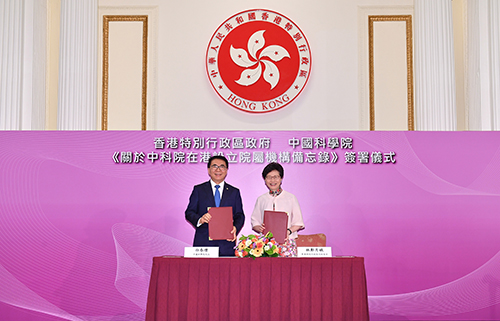

The Chinese Academy of Sciences signed a memorandum of understanding with the Hong Kong Special Administrative Region Government on the establishment of research institutions affiliated to CAS in Hong Kong on Nov 8.
According to the memorandum, the new institutions will rely on CAS’s Guangzhou Institutes of Biomedicine and Health and the Institute of Automation and settle in the Hong Kong Science Park as "Health@Inno HK and AIR@Inno HK" focusing on healthcare, artificial intelligence (AI) and robotics technologies.

CAS president Bai Chunli (L) and Hong Kong Chief Executive Carrie Lam Cheng Yuet-ngor at the signing ceremony in Hong Kong on Nov 8.
The memo states that the institutions will promote scientific innovation, achievement transformation, coordination and liaison, and popular science education through giving full play to CAS’s scientific strengths and Hong Kong's "one country, two systems".
These institutions will become an important part of an international technology and innovation center in the Guangdong-Hong Kong-Macao Greater Bay Area.
In his speech, CAS President Bai Chunli pointed out that the two sides have a solid foundation for cooperation, adding that CAS has built 22 laboratories with six universities in Hong Kong and carried out substantive and mutually beneficial cooperation.
CAS will prioritize the construction of the biomedicine and AI innovation centers in Hong Kong under the overall framework of the Hong Kong Institute of Innovation, Bai stated.
Hong Kong Chief Executive Carrie Lam Cheng Yuet-ngor said that the memorandum opened a new chapter for scientific cooperation between the mainland and Hong Kong.
She went on to say that the construction of CAS institutions in Hong Kong will promote local technological innovation and bring new opportunities for both sides’ scientific circles.
She also announced that Hong Kong's University Grants Committee will launch a financing plan to support joint laboratories that are accredited by CAS.
Source:CAS